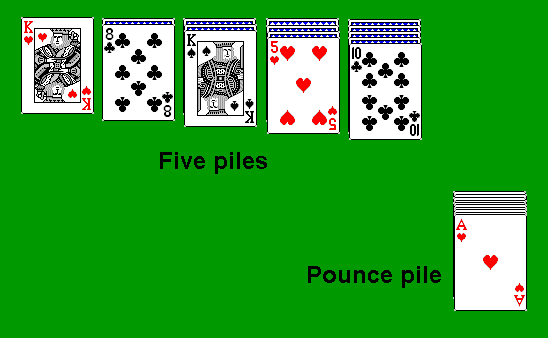Pounce
Pounce is a card game for two or more players, but works best with no more than six. It is played like solitaire, with each player in command of his own deck of cards, but all building piles are shared between all players. To win, you will need fast hands, quick thinking, and more than a little luck.
Setup
To begin, each player must have his own deck of cards, and each deck must have a unique back design to it. Verify that all decks contain 52 cards, with no jokers or other extraneous cards. Nominate one person to be scorekeeper; the scorekeeper needs only a pen and standard writing pad. Find a table large enough to seat all players, with plenty of room in the middle. Now each player must shuffle his deck and layout his cards into six piles according to the following rules: The first five piles are made as in Klondike solitaire, and the sixth pile is made by counting out nine cards from the top of the deck and laying them in a face up pile, in the same order as when they were in the deck. Each player’s layout will look like this:

The remaining cards will be used for stock. Then the scorekeeper will say "Ready ... Go!" and play will begin.
How To Play
Play is like Klondike solitaire. Aces may be placed in the field (the table space bounded by all players' layouts) to start build piles. Building on a build pile means placing the next higher card in rank of the same suit on top of the top card of the pile. So if the build pile's top card is a 4 or hearts, only a 5 of hearts may be played on it. Within a player's five piles, the top cards may be built upon in descending order, alternating red-black-red-black. When all face-up cards have been removed from one of the five piles, turn over the topmost face-down card. If there are no face down cards left in that pile, the top card of the pounce pile (a "pounce card") or a king may be placed there.
Unlike in solitaire, in pounce players count off their stock in threes by palming the first card (face down), then the second card, then the third card, then laying them face up with the first card on top You can tell that you're doing it right by the sound: "flip-flip-flip-thump", etc. When the stock is all face up, pick it up and start again.
In each hand of pounce, the object is to get rid of your pounce pile. Pounce cards can be removed from the pile two ways: playing them on build piles and filling empty spaces in the five piles. Cards in the pounce pile may not be played directly on cards in the five piles. They may only be played on empty spaces.
When a player has removed the final card from his pounce pile, he says "Pounce!" and play immediately stops. Every other player must count the number of pounce cards he has. Scoring may then begin.
Special Rules:
If a build pile goes all the way up to king, the player who played the king on the pile must say "Stop" and remove the pile from play. When the pile has been removed and everybody is ready again, the scorekeeper will signal to continue play.
The one-hand rule: No player may use both hands for building, either on build piles or the player's five piles, at the same time. It is best to always keep your stock in one hand and use the other for building.
Pounce is generally a silent game during the actual gameplay. No player may intentionally vocally distract other players. This includes muttering to yourself.
If all players agree that they cannot build with their current configuration of cards, then play will stop, and each player will pull the bottom face-down card from the rightmost of their five piles that has face-down cards. Any player without any remaining face-down cards is SOL. If the card does not play it is added to the bottom of the player's stock.
At times two players will make a play for the same build pile at the same time. The one who makes the play first gets it, but the other player is not entitled to smash the victor's fingers.
Scoring
As previously stated, when a player goes pounce, all other players must count the number of remaining pounce cards that they have. Each of these cards counts as -2 points against the player's score.
After each player has made note of this, all build piles, complete and incomplete, are gathered, separated by owner, and giver back to each player. Players score 1 point for each card played on a build pile in that round.
(Note: it is standard practice to first count off the pounce card deduction (2x number of pounce cards left) from the scoring cards, set them aside, then count the remaining scoring cards. This remainder is the player's score for the round.)
The scorekeeper then adds that score to the player's previous score (or subtracts it, if the player has a negative score for the round). All decks are shuffled, new piles are laid out, and play begins again.
Winning
The first player to score 100 points is the winner!
COMMENTS








